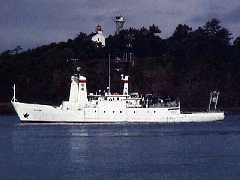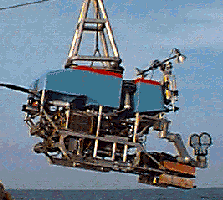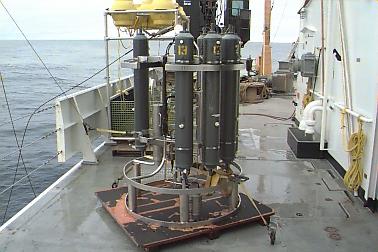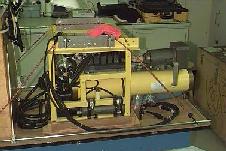WHAT'S NEW:
BACKGROUND:
Mission
Project Description
Cruise Plans:
Participants
Technology (ROV, ships, etc.)
Future Plans
Results:
1998 NeMO Cruise
Axial 1998 "Eruption"
TECHNOLOGY/TOOLS
SHIPS:
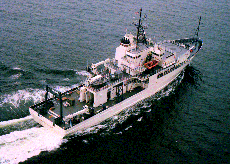
R/V Thomas Thompson
Operated by the University of Washingtons's School of Oceanography. (Sister ships include the NOAA's Ronald Brown, SIO's Roger Revelle and WHOI's Atlantis). The Thompson can accommodate 34 scientists, 22 officers and crew and 2 marine technicians for 33 days at 14 knots plus 29 days at 3 knots.
Operated by Oregon State University. The Wecoma carries 13 crew and 18 scientists for 14-30 days at 10-14.5 knots. The Wecoma's sister ship is the Oceanus operated by Woods Hole Oceanograpic Institution.
Remotely Operated Vehicle (ROV):
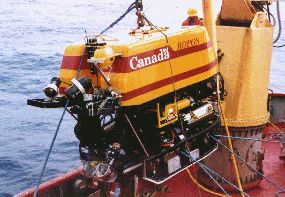
ROPOS
ROVs are used when fine-scale mapping and sampling are required on the seafloor. Unlike manned submersibles which have very limited bottom time, ROVs can explore the seafloor for unlimited amounts of time before coming to the surface. NeMO will be using the Remotely Operated Platform for Ocean Science (ROPOS) on the first 1999 Thomas Thompson Cruise.
Jason will be participating on the second Thompson cruise. Jason will be deploying the extensometer as well as a mooring at Axial. Jason has participate in many scientific endeavors as well as working on the exploration of the wreckage of the Titanic. Jason is operated by the Woods Hole Oceanographic Institute.
Science Instruments:
Included on ROPOS
1) SIT camera
2) Color 3-chip camera
3) 5 and 7 function manipulators
4) Mesotech forward-looking sonar
5) Depth, heading, altitude measurements
6) Still camera (35 mm)
7) Standard sample tray
Project-Specific Instrumentation
Conductivity, temperature and depth recorder (CTD) will be used on the Wecoma cruise to help map out the plumes generated from the discharge of the hydrothermal vents at Axial Volcano. The CTD instrument is cast up & down or towed from the ship. Data is sent back in real-time to the ship's laboratory where scientists can evaluate the location of the plumes. Scientists can distinguish plumes from vents which are consistently discharging fluids vs. those generated from a seismic event.
System Used to Assess Vented Emissions (SUAVE) provides continous in-situ analysis of hydrothermal vent chemicals. SUAVE can be used on CTD's, ROV's and ALVIN. SUAVE will be used on the Wecoma cruise in 1999.
To be used on the ROVs:
1) PMEL fluid sampler
2) Ti Gas samplers
3) BioBox
4) PacMan
5) Hi-Temperature probe
6) Niskin bottles
7) Suction sampler
8)Imagenex downward-looking scanning sonar
Deployed Instrumentation
1) Extensometers
2) HOBO Hi-temp probes (up to 4)
3) Low-temp probes (up to 10)
4)Osmosamplers (MBARI)
5)Time-lapse camera(s)
6) Markers
7) Bacteria traps (microbial colonization chambers)
8) Seafloor navigation beacons (transponders)
For more information:
Credits/Contacts
oar.pmel.vents.webmaster@noaa.gov
